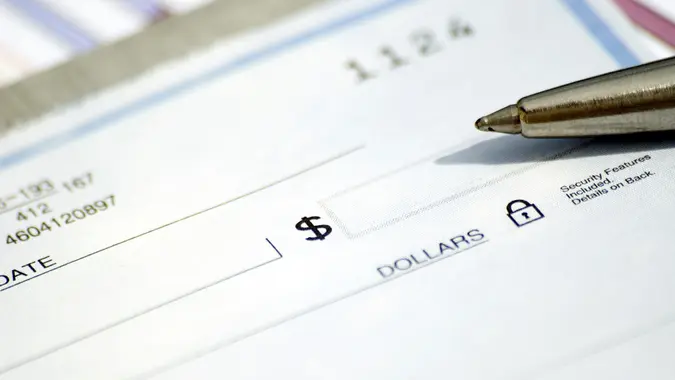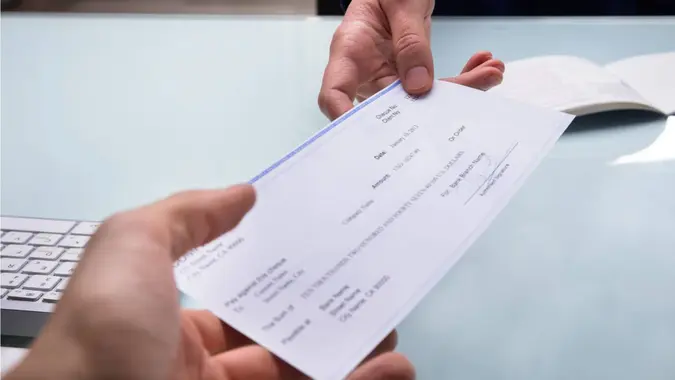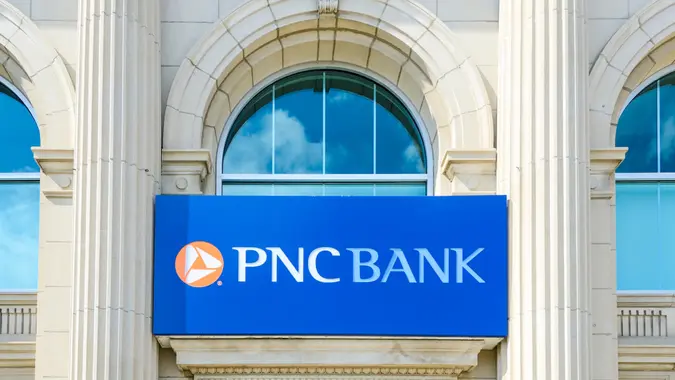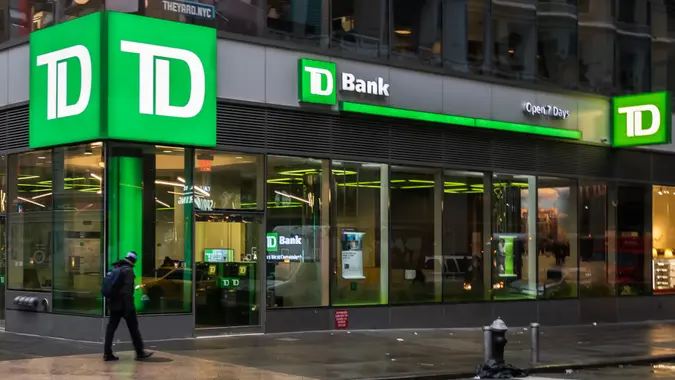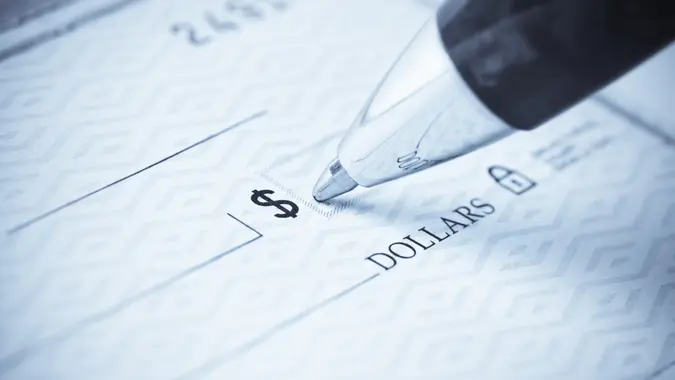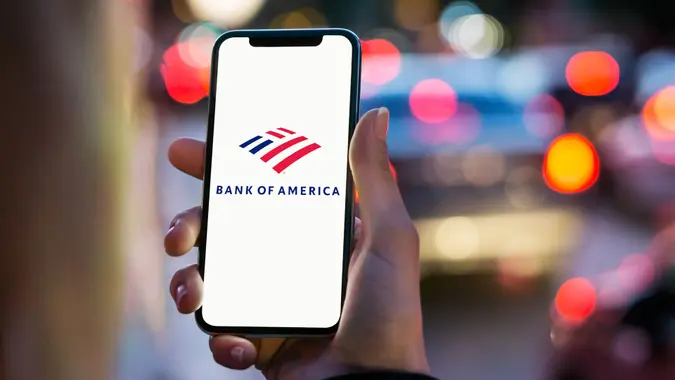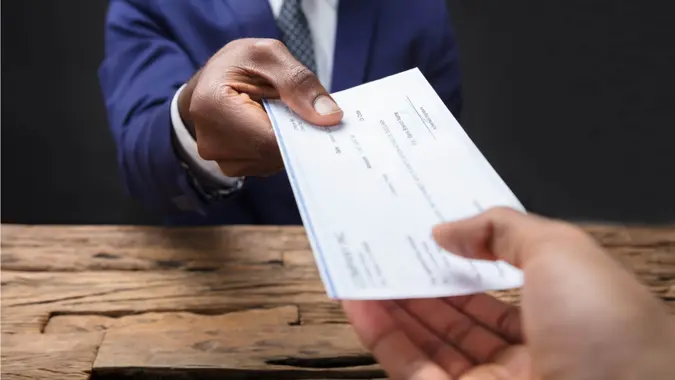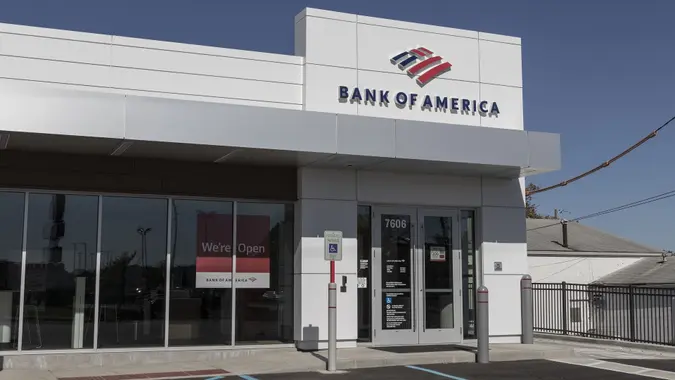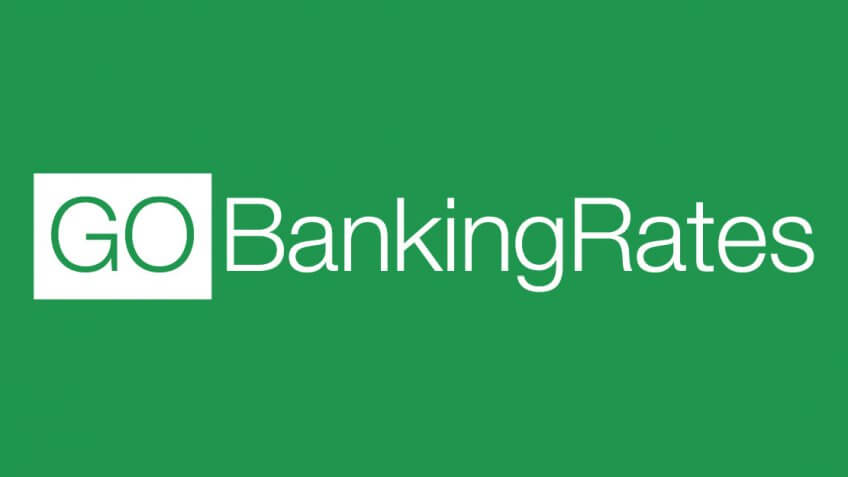Postdated Check: What Are The Rules and Is It Legal?

Commitment to Our Readers
GOBankingRates' editorial team is committed to bringing you unbiased reviews and information. We use data-driven methodologies to evaluate financial products and services - our reviews and ratings are not influenced by advertisers. You can read more about our editorial guidelines and our products and services review methodology.

20 Years
Helping You Live Richer

Reviewed
by Experts

Trusted by
Millions of Readers
Often seen as a convenient way to manage future payments, the use of postdated checks comes with its own set of rules and legal considerations. Whether you’re issuing one to delay a payment or receiving one as a promise of payment at a later date, it’s important to know what you’re dealing with. Read on to uncover the ins and outs of postdated checks, including their legality and the rules governing their use.
How Postdated Checks Work
A postdated check is a check written with a date in the future rather than the date it was signed. This means the check cannot be cashed or deposited until the date specified. People use postdated checks for various reasons, such as ensuring payment is deferred until they have sufficient funds in their checking account or aligning the check’s cashing with a future financial obligation.
Do Banks Honor Postdated Checks?
In most cases, yes, banks will honor a postdated check. The rules governing postdated checks can vary by state and bank. Here are a few rules that typically apply:
- Notification: It’s advisable to inform the bank and the check recipient about the postdate. This minimizes the risk of the check being processed before the intended date.
- Bank policies: Banks have different policies regarding postdated checks. Some may refuse to accept them, while others process them only on or after the date written on the check.
Risks and Limitations of Postdating Checks
If you postdate a check and give it to someone as payment, it doesn’t mean that your check is safe. In fact, banks may choose to deposit a check before the date written, which can end up overdrafting your account or end up with an insufficient funds fee.
If your check is returned due to insufficient funds, it could be considered illegal if law enforcement determines you intended to defraud the recipient of the check. [1] This is where the legal waters get murky. It’s essential to ensure there will be enough in your bank account to cover the check when it’s due to be cashed.
Finally, some banks simply won’t honor postdated checks and require only depositing the check on or after the date written.
Bank Account Management Tips
Handling postdated checks requires careful financial planning, especially when it comes to managing your bank accounts.
If you’re issuing a postdated check, it’s essential to ensure that the designated checking account will have adequate funds by the check’s date. This might mean moving money from your savings account or even considering the maturity date of any CD accounts you own to ensure liquidity.
It’s equally important for recipients to remember that a postdated check won’t immediately be available as funds in your account. Planning ahead for the delay in processing can help avoid any financial hiccups.
Practical Scenarios for Using Postdated Checks
Here are a few reasons you might end up using (or receiving) a postdated check:
Rent payments. If you hand over your rent check before the first of the month (or send it in the mail), you may be postdating it. This is perfectly normal, but it may not prevent your landlord’s bank from cashing the check early.
Larger purchases. If you plan to make a larger purchase, you may postdate a check to a date when you’ll have the money in place.
Paying a friend back. If you owe a friend money, you might postdate a check to when you get paid next to ensure you can pay them back.
It’s essential to communicate clearly with anyone you give a postdated check to — ensuring they understand your requirements for when to attempt cashing the check. If your check is cashed early, it can end up costing you more with NSF fees or even potential fraud charges.
Alternatives to Postdating Checks
These methods allow for scheduled payments without the risks associated with postdated checks:
- Direct deposits: Ideal for recurring payments such as salaries or regular bills, direct deposits ensure funds are automatically transferred to the recipient’s account on specified dates.
- Bill pay services: Offered by most banks, bill pay services enable customers to set up payments for bills directly from their checking account, scheduling them to be sent on specific future dates. This is particularly useful when you’ve recently opened a new account and are setting up your financial arrangements.
- Mobile payment apps: Apps like Venmo, PayPal, or Zelle allow users to send money to individuals or businesses, and some allow users to schedule payments ahead of time.
While postdated checks are standard, they come with a set of rules and legal considerations. Whether you’re writing or receiving a postdated check, it’s vital to communicate openly with all parties involved and understand the policies of the involved banks. By doing so, you can ensure that these checks serve their intended purpose without leading to financial misunderstandings or legal complications.
Editor's note: This article was produced via automated technology and then fine-tuned and verified for accuracy by a member of GOBankingRates' editorial team.
Our in-house research team and on-site financial experts work together to create content that’s accurate, impartial, and up to date. We fact-check every single statistic, quote and fact using trusted primary resources to make sure the information we provide is correct. You can learn more about GOBankingRates’ processes and standards in our editorial policy.
- U.S. News. 2023. "Postdated Checks Guide."
 Written by
Written by  Edited by
Edited by 



